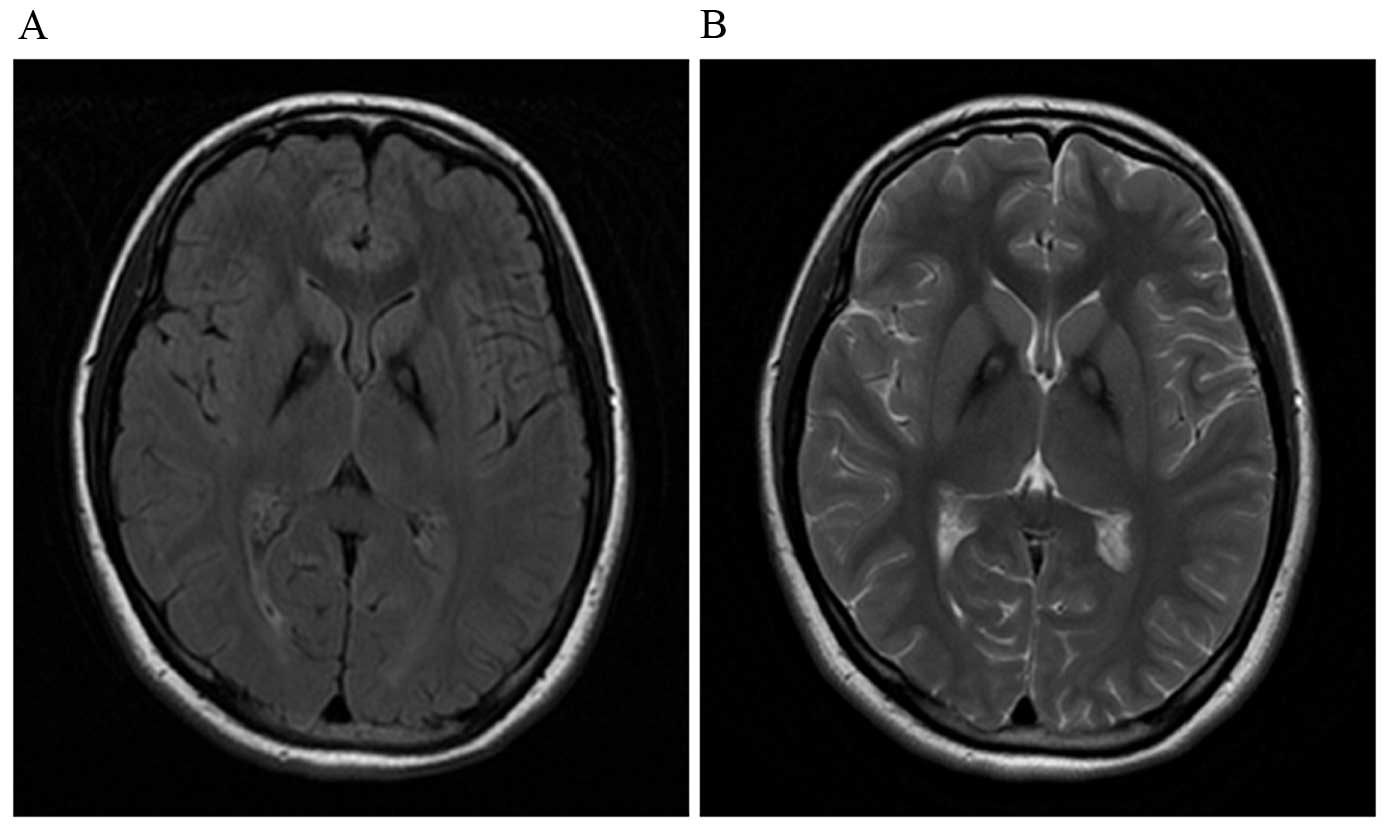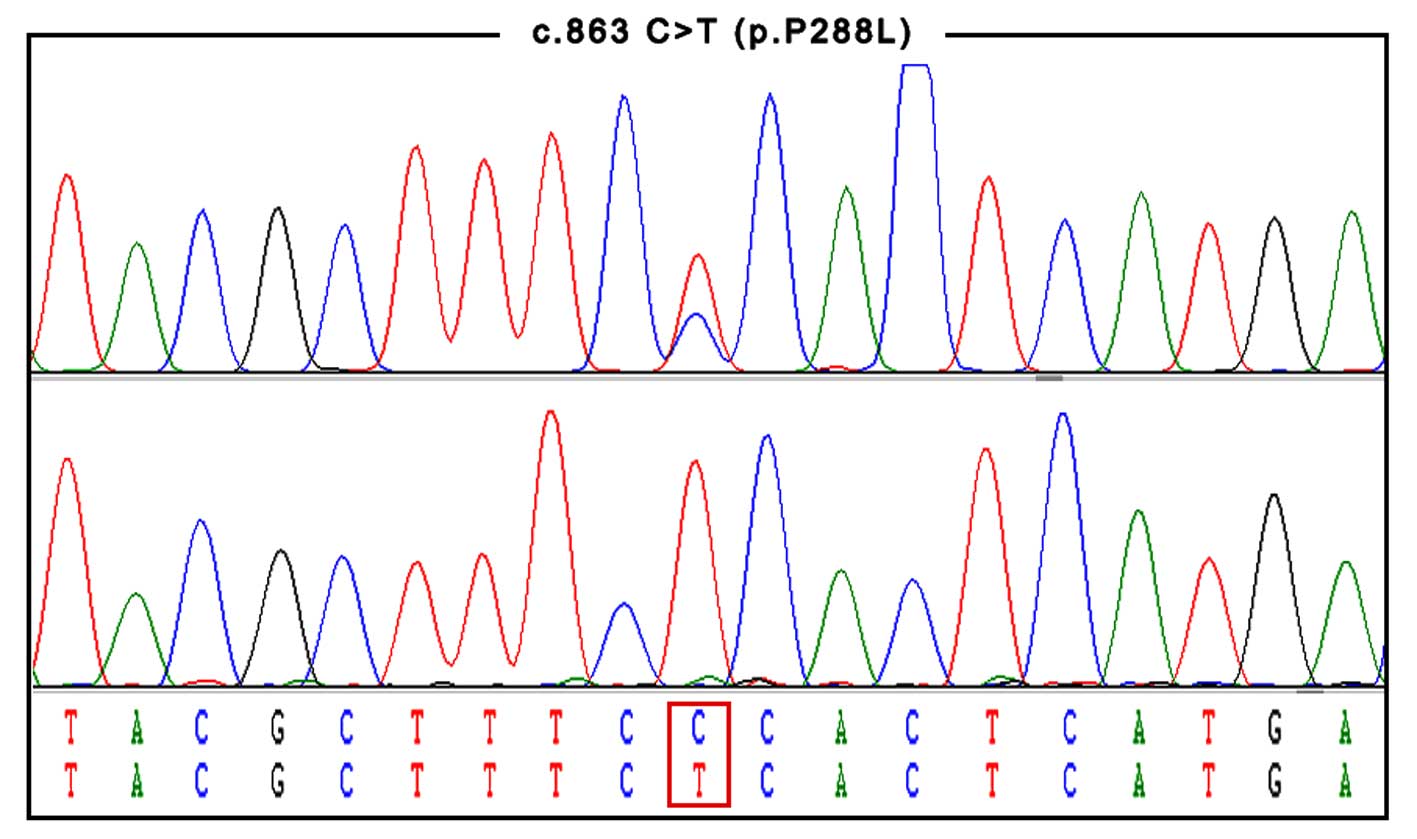|
1
|
Zhou B, Westaway SK, Levinson B, Johnson
MA, Gitschier J and Hayflick SJ: A novel pantothenate kinase gene
(PANK2) is defective in Hallervorden-Spatz syndrome. Nat Genet.
28:345–349. 2001. View
Article : Google Scholar : PubMed/NCBI
|
|
2
|
Hogarth P: Neurodegeneration with brain
iron accumulation: Diagnosis and management. J Mov Disord. 8:1–13.
2015. View Article : Google Scholar : PubMed/NCBI
|
|
3
|
Tonekaboni SH and Mollamohammadi M:
Neurodegeneration with brain iron accumulation: An overview. Iran J
Child Neurol. 8:1–8. 2014.PubMed/NCBI
|
|
4
|
Hayflick SJ, Westaway SK, Levinson B, Zhou
B, Johnson MA, Ching KH and Gitschier J: Genetic, clinical, and
radiographic delineation of Hallervorden-Spatz syndrome. N Engl J
Med. 348:33–40. 2003. View Article : Google Scholar : PubMed/NCBI
|
|
5
|
Song XW, Wang YL, Shi YW, Deng WY, Chen
SQ, Lin H, Yi YH and Liao WP: Clinical manifestations and detection
of pantothenate kinase 2 gene mutation in a patient with
Hallervorden-Spatz syndrome. Zhonghua Yi Xue Za Zhi. 89:3320–3323.
2009.(In Chinese). PubMed/NCBI
|
|
6
|
Zhang Y, Tang B, Guo J, Long Z, Xia K, Pan
Q, Hu Z, Wu D, Tang J, Chen T and Yan X: Studies on PANK2 gene
mutations in Chinese patients with Hallervorden-Spatz syndrome.
Zhonghua Yi Xue Yi Chuan Xue Za Zhi. 22:189–191. 2005.(In Chinese).
PubMed/NCBI
|
|
7
|
Fung GP and Chan KY: Cervical myelopathy
in an adolescent with Hallervorden-Spatz disease. Pediatr Neurol.
29:337–340. 2003. View Article : Google Scholar : PubMed/NCBI
|
|
8
|
Wu YR, Chen CM, Chao CY, Lyu RK and
Lee-Chen GJ: Pantothenate kinase-associated neurodegeneration in
two Taiwanese siblings: Identification of a novel PANK2 gene
mutation. Mov Disord. 24:940–941. 2009. View Article : Google Scholar : PubMed/NCBI
|
|
9
|
Zhang YH, Tang BS, Zhao AL, Xia K, Long
ZG, Guo JF, Westaway SK and Hayflick SJ: Novel compound
heterozygous mutations in the PANK2 gene in a Chinese patient with
atypical pantothenate kinase-associated neurodegeneration. Mov
Disord. 20:819–821. 2005. View Article : Google Scholar : PubMed/NCBI
|
|
10
|
Ma LY, Wang L, Yang YM, Lu Y, Cheng FB and
Wan XH: Novel gene mutations and clinical features in patients with
pantothenate kinase-associated neurodegeneration. Clin Genet.
87:93–95. 2015. View Article : Google Scholar : PubMed/NCBI
|
|
11
|
Thomas M, Hayflick SJ and Jankovic J:
Clinical heterogeneity of neurodegeneration with brain iron
accumulation (Hallervorden-Spatz syndrome) and pantothenate
kinase-associated neurodegeneration. Mov Disord. 19:36–42. 2004.
View Article : Google Scholar : PubMed/NCBI
|
|
12
|
Hallervorden J and Spatz H: Eigenartige
Erkrankung im extrapyramidalen System mit besonderer Beteiligung
des Globus pallidus und der Substantia nigra. Z Ges Neurol
Psychiatr. 79:254–302. 1922. View Article : Google Scholar
|
|
13
|
Popławska-Domaszewicz K,
Florczak-Wyspiańska J and Kozubski W: Update on neurodegeneration
with brain iron accumulation. Neurol Neurochir Pol. 48:206–213.
2014.PubMed/NCBI
|
|
14
|
Hartig MB, Hörtnagel K, Garavaglia B,
Zorzi G, Kmiec T, Klopstock T, Rostasy K, Svetel M, Kostic VS,
Schuelke M, et al: Genotypic and phenotypic spectrum of PANK2
mutations in patients with neurodegeneration with brain iron
accumulation. Ann Neurol. 59:248–256. 2006. View Article : Google Scholar : PubMed/NCBI
|
|
15
|
Yamashita S, Maeda Y, Ohmori H, Uchida Y,
Hirano T, Yonemura K, Uyama E and Uchino M: Pantothenate
kinase-associated neurodegeneration initially presenting as
postural tremor alone in a Japanese family with homozygous N245S
substitutions in the pantothenate kinase gene. J Neurol Sci.
225:129–133. 2004. View Article : Google Scholar : PubMed/NCBI
|
|
16
|
Lee CH, Lu CS, Chuang WL, Yeh TH, Jung SM,
Huang CL and Lai SC: Phenotypes and genotypes of patients with
pantothenate kinase-associated neurodegeneration in Asian and
Caucasian populations: 2 cases and literature review.
ScientificWorldJournal. 2013:8605392013. View Article : Google Scholar : PubMed/NCBI
|
















